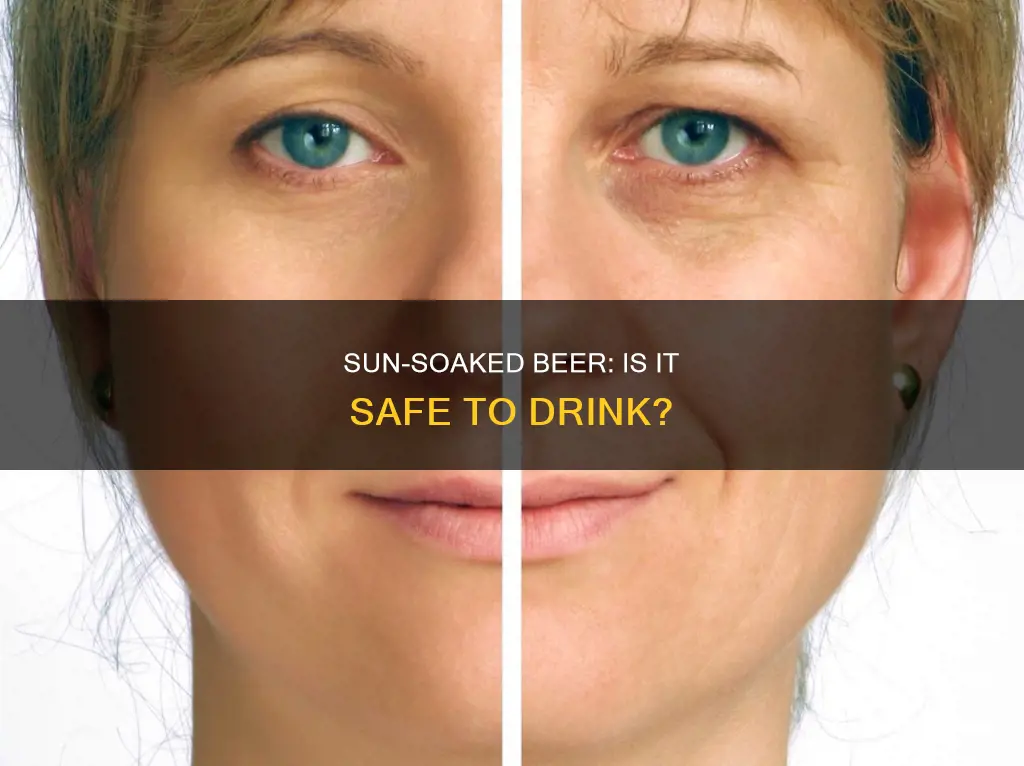
Beer is a beloved beverage for many, but what happens when it's left out in the sun? This is a common question, especially for those who enjoy a cold brew on a hot day. So, can you drink beer that has been sitting in the sun? The short answer is: it depends. While it may not be dangerous to consume, the quality and taste of the beer can be significantly affected by exposure to sunlight and heat.
| Characteristics | Values |
|---|---|
| Effect of Sunlight on Beer | Direct sunlight can cause beer to spoil and develop a "skunk-like" smell due to the UV rays' interaction with the essential oils of hops. |
| Effect of Heat on Beer | Heat itself does not create a specific off-flavor but accelerates oxidation, leading to a stale, cardboard-like taste. Prolonged exposure to intense heat breaks down organic molecules, negatively impacting flavor. |
| Effect of Oxygen on Beer | Oxygen is responsible for aging beer, and exposure to it can affect the taste over time. |
| Drinking Beer Left in the Sun | Drinking beer exposed to sunlight is generally considered safe but may result in an unpleasant taste and odor. It is advised to avoid drinking if it has been heated to very high temperatures. |
| Preventing Beer From Sun Damage | Store beer in a cool, dark place, such as a refrigerator or a trunk. Canned beer and brown glass bottles offer better protection from UV rays than clear glass bottles. |
| Beer Left Out Overnight | Beer can be left out overnight and consumed the next day, but it may start to taste flat and unappealing. |
What You'll Learn

Is it safe to drink beer that's been left in the sun?
Sunlight, heat, and oxygen can all cause beer to spoil, but the effects on the drinker are not dangerous. Beer that has been left in the sun will likely have a bad taste and smell, but it is still safe to drink.
Sunlight
The UV rays in sunlight react with the hops in beer, creating a chemical reaction that gives the beer a skunk-like smell and taste. This is why beer is often stored in brown glass bottles, as brown glass offers more protection from UV rays than clear or green glass.
Heat
Heat does not create a specific off-flavour, but it does speed up the process of oxidation. Oxidation can cause beer to develop a stale, cardboard-like flavour, sometimes accompanied by a note of sherry. More malt-forward beers can even develop a sweet, bready, toffee-like flavour.
Oxygen
Oxygen is responsible for ageing a beer, and standing a bottle on its side can accelerate the process. Oxygen can also affect the taste of beer over time, even if the bottle is unopened.
Although it is not dangerous to drink beer that has been left in the sun, it is not recommended due to the unpleasant taste and smell. Beer that has been exposed to sunlight will likely have a skunk-like smell and taste, and may also have developed stale, sweet, or toffee-like flavours due to oxidation.
Hiking and Beer: A Good Mix?
You may want to see also

How does sunlight affect beer?
Sunlight can have a detrimental effect on beer, causing it to spoil and negatively impacting its taste and appearance. The UV rays in sunlight react with the chemical compounds in hops, raising the temperature of the beer and causing a chemical reaction with the essential oils in hops, which results in an unpleasant skunk-like smell. This is why beer is often described as having "skunked".
The impact of sunlight on beer is worsened by higher temperatures and prolonged exposure. The sun's UV rays speed up the process of oxidation, which can make beer taste stale, like cardboard, or develop a note of sherry. More malt-forward beers may even develop a sweet, bready, and toffee-like flavour.
The type of beer also influences the impact of sunlight. Darker beers, such as stouts and porters, are less affected by sunlight as they absorb a wider spectrum of light and are less bitter initially. On the other hand, pale beers, particularly IPAs and NEIPAs, are more susceptible to sunlight due to their higher hop content and pale colour.
The container that the beer is in also makes a difference. Canned beer is opaque and unaffected by UV rays, whereas clear glass bottles offer no protection from the sun. Brown glass bottles provide the best protection against sunlight, followed by green glass bottles.
To prevent sunlight from ruining your beer, it is recommended to keep it in a cool, dark place, such as a refrigerator or a trunk. If beer is left out in the sun, it is best to consume it within a day or two, as it will start to taste flat and unappealing over time.
Rockport Beach: Beer Drinking Allowed or Not?
You may want to see also

What are the best ways to prevent beer from spoiling in the sun?
Beer is susceptible to spoilage by various factors, including sunlight, heat, oxygen, and bacteria. Here are some of the best ways to prevent beer from spoiling in the sun:
Keep Beer in the Shade:
The sun's UV rays can cause beer to spoil, so it's best to keep it out of direct sunlight. Store your beer in a cool, dark place, such as a refrigerator or a dark room. If you're outdoors, keep it in a cooler or shaded area.
Choose the Right Bottle or Can:
The colour of the bottle or can also matters. Canned beer is ideal as it is opaque and completely blocks UV rays. If you're using bottles, opt for brown glass bottles, which offer better protection against sunlight than green or clear glass bottles.
Select the Right Type of Beer:
Darker beers, such as stouts and porters, are more resistant to the sun's effects. They absorb a wider spectrum of light and are less likely to be affected by UV rays. Lighter beers, especially pale ales and IPAs, are more susceptible to spoilage from sunlight.
Maintain a Consistent Temperature:
Avoid frequent temperature changes, especially rapid increases in temperature. Keep your beer at a consistent, cool temperature. Store it in a refrigerator or a cool room, and avoid placing it near heat sources like radiators.
Drink Fresh Beer:
Beer has a shelf life, and the longer it sits, the more likely it is to spoil. Consume beer within a few months of purchase, especially for lower-alcohol beers. For higher-alcohol beers, ageing can improve their flavour, but they should still be kept out of direct sunlight.
By following these tips, you can help prevent your beer from spoiling in the sun and ensure that it stays fresh and tasty for longer. Remember, beer that has been exposed to sunlight may develop an unpleasant taste and smell, so it's best to prioritise prevention and proper storage.
Beer in Muslim Countries: What's the Deal?
You may want to see also

What are the best types of bottles to prevent spoilage?
When it comes to preventing spoilage, the type of bottle you use for your beer can make a big difference. Here are some of the best options:
Brown Glass Bottles
Brown glass bottles are one of the best options for preventing spoilage. They offer superior protection against sunlight compared to other types of glass bottles. The dark colour absorbs a wider spectrum of light, reducing the amount of UV rays that reach the beer. This helps to prevent the chemical reaction between UV light and the essential oils in hops, which can result in a skunk-like smell and taste.
Opaque Bottles
Opaque bottles, whether made of glass or another material, can also be effective at preventing spoilage. The opacity blocks UV rays from reaching the beer, keeping it protected from sunlight. This can be a good option for beers that are particularly sensitive to light or for outdoor activities where the bottles may be exposed to direct sunlight.
Swing-Top Bottles
Swing-top bottles, also known as Grolsch-style bottles, offer several advantages for preventing spoilage. Firstly, they create a tight seal that helps keep the beer fresh and carbonated. Secondly, they are reusable, reducing waste and making them a more environmentally friendly option. Additionally, the thick, durable glass used in swing-top bottles makes them less likely to break.
Canned Beer
While not a bottle, canned beer deserves a mention as it is highly effective at preventing spoilage. The opaque nature of cans completely blocks UV rays, ensuring the beer is unaffected by sunlight. Cans also capture less oxygen during the canning process, resulting in a longer shelf life for the beer.
Storing Bottles Upright
Regardless of the type of bottle you choose, it is important to store your beer bottles upright. Storing bottles upright minimises the surface area exposed to air, slowing down oxidation and preventing spoilage. This is especially important for unfiltered or bottle-conditioned beers, as it allows yeast to settle at the bottom of the bottle.
Beer and Librium: A Risky Mix?
You may want to see also

What are the best storage methods for beer?
When it comes to storing beer, there are several factors to consider to ensure that its quality is preserved and spoilage is prevented. Here are some of the best practices for storing beer:
- Shield from Light: Beer is sensitive to light, especially UV rays. Store beer bottles in a cool, dark place, such as a refrigerator, away from direct sunlight or fluorescent lighting. Brown bottles are preferable to green or clear bottles as they offer better protection from light.
- Maintain Optimal Temperature: Keep beer at a temperature that is slightly above the serving temperature for that particular beer. Generally, storing beer between 45°F and 60°F (7°C to 16°C) is recommended. Stronger beers like Imperial Stouts and Dark Ales should be stored at 53°F to 60°F (12°C-16°C), while lighter beers like Lagers and Pilsners are best stored at 44°F to 50°F (7°C-10°C).
- Avoid Temperature Fluctuations: Consistency in temperature is crucial. Fluctuations in temperature can cause premature aging and alter the intended flavours of the beer.
- Maintain Steady Humidity: Keep the humidity level between 50% and 70% to prevent corks or caps from drying out, especially for cork-sealed bottles.
- Store Upright: Storing beer bottles upright reduces the surface area exposed to air, minimising the potential for oxidation and flavour changes.
- Choose the Right Container: Beer in cans or brown bottles is ideal as they provide better protection from light and oxygen. If using clear or green bottles, store them in a dark place or cover them with a cloth.
- Keep Away from Strong Odours: Avoid storing beer near strong-smelling substances like gasoline or fertilisers, especially for cork-sealed or bottle-conditioned beers, as they are more susceptible to absorbing unwanted aromas.
- Cleanliness: Maintain cleanliness in the storage area to prevent mould and bacteria from contaminating the beer.
- Consider Special Cases: For home-brewed beer or beer intended for aging, additional considerations may apply. Home-brewed beer may require different containers and specific temperature conditions during the fermentation process. For aging beer, choose full-bodied, high-ABV beers and store them in a cool, dark, and undisturbed place.
By following these storage methods, you can help ensure that your beer stays fresh, preserves its intended flavours and aromas, and extends its shelf life.
The Science of Nitro Beers: How Do They Work?
You may want to see also
Frequently asked questions
Beer left in the sun is safe to drink and won't make you sick. However, it may not be very pleasant as it can develop a skunk-like smell and a stale, cardboard-like taste.
UV rays from the sun interact with the essential oils in hops, creating chemical compounds that give off a skunk-like smell. This process also affects the appearance of the beer.
Yes, darker beers are less likely to be impacted by sunlight as they absorb a wider spectrum of light. Pale beers, particularly IPAs and NEIPAs, are the most susceptible to sunlight and will lose their taste over time.
To prevent your beer from being affected by the sun, keep it in a cool, dark place, such as a refrigerator or a trunk. Brown glass bottles or cans are also better at protecting your beer from sunlight than clear or green glass bottles.







